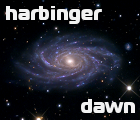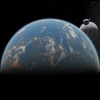|
The Universe's Edge
|
|
| DoctorOfSpace | Date: Saturday, 01.09.2012, 14:48 | Message # 31 |
 Galaxy Architect
Group: Global Moderators
 Pirate
Pirate
Messages: 3600
Status: Offline
| Quote (HarbingerDawn) You could argue that they are fine tuned if you can demonstrate that life does in fact require all these physical constants to be very nearly exactly as they are, and if you can demonstrate that other universes do not and have not existed. As far as I know neither of those things has been demonstrated. I just dislike it when people use the term "fine tuned" because it implicitly invokes intelligent design.
I much like the idea that when we see something that appears to be fine tuned it is more likely some sort of mechanism we do not understand yet.
Intel Core i7-5820K 4.2GHz 6-Core Processor
G.Skill Ripjaws V Series 32GB (4 x 8GB) DDR4-2400 Memory
EVGA GTX 980 Ti SC 6GB
|
| |
| |
| SlyReaper | Date: Saturday, 01.09.2012, 15:03 | Message # 32 |
 Observer
Group: Users
 United Kingdom
United Kingdom
Messages: 18
Status: Offline
| Quote (HarbingerDawn) You could argue that they are fine tuned if you can demonstrate that life does in fact require all these physical constants to be very nearly exactly as they are, and if you can demonstrate that other universes do not and have not existed. As far as I know neither of those things has been demonstrated. I just dislike it when people use the term "fine tuned" because it implicitly invokes intelligent design.
Invoking intelligent design was certainly not my intention, I really do want to distance myself as much as possible from that nonsense. By "fine tuning", I mean that if certain forces or constants were different, then stars would be unable to form, or they would burn out too quickly, or any other number of things that would make life extremely difficult. For example, try doubling the speed of light. Suddenly, the amount of energy bound up in mass is quadrupled thanks to E=MC^2. This would surely do weird things to how bright and how fast stars burn. It took 4.5 billion years for intelligent life to evolve on this planet, as far as we know; if the sun had a significantly shorter lifespan thanks to tweaked universal constants, then it might never have happened. And that's just by tweaking one constant. What happens if you tweak the strong or weak nuclear forces, or electromagnetism or gravity? Stars and planets may never be able to form. Or any grouping of matter dense enough to form a planet might collapse into a black hole.
I suppose it's similar to the problem of "why is the earth 93 million miles away from the sun - the distance which allows life as we know it". The answer is there's bound to be at least one planet out there in the universe at that correct distance from its star. Likewise, there's bound to be at least one universe out there with life-friendly laws of physics, assuming we allow the existence of alternate universes with alternate physics.
Quote (HarbingerDawn) I think that one day, if humanity and science continue to exist and progress, we will know the answers about how our universe got here and whether there are or were others.
Not necessarily. It has been mentioned before that we exist in a somewhat privileged time in the evolution of the universe. As the universe expands, and accelerates in its expansion, then distant galaxies will slip over the edge of the cosmological horizon. Eventually there will be no other galaxies observable other than our own, and we'll exist in that "island universe" that we thought we had before the discovery of other galaxies. So if the distant future will be blind to certain things, who's to say we're not blind to certain things now? Things that are impossible to know simply because of physical limitations like the speed of light?
|
| |
| |
| HarbingerDawn | Date: Saturday, 01.09.2012, 15:14 | Message # 33 |
 Cosmic Curator
Group: Administrators
 United States
United States
Messages: 8717
Status: Offline
| Quote (SlyReaper) Invoking intelligent design was certainly not my intention, I really do want to distance myself as much as possible from that nonsense.
I know, I was simply talking about the term itself, not you using it.
Quote (SlyReaper) Not necessarily. It has been mentioned before that we exist in a somewhat privileged time in the evolution of the universe. As the universe expands, and accelerates in its expansion, then distant galaxies will slip over the edge of the cosmological horizon. Eventually there will be no other galaxies observable other than our own, and we'll exist in that "island universe" that we thought we had before the discovery of other galaxies. So if the distant future will be blind to certain things, who's to say we're not blind to certain things now? Things that are impossible to know simply because of physical limitations like the speed of light?
I didn't say that we will definitely know. I just said that I think we will figure it out. I have nothing solid on which to support that, it's just my opinion/hope.
All forum users, please read this!
My SE mods and addons
Phenom II X6 1090T 3.2 GHz, 16 GB DDR3 RAM, GTX 970 3584 MB VRAM
|
| |
| |
| SlyReaper | Date: Saturday, 01.09.2012, 15:20 | Message # 34 |
 Observer
Group: Users
 United Kingdom
United Kingdom
Messages: 18
Status: Offline
| Quote (HarbingerDawn) I didn't say that we will definitely know. I just said that I think we will figure it out. I have nothing solid on which to support that, it's just my opinion/hope.
Oh, I hope so too. I just think it might be a bit optimistic to think we'll figure it out given enough time. The speed of light prevents us seeing anything over the cosmological horizon, and it might be the the last vital clue about the mechanics of universe formation has already disappeared over it. Or some other horizon we don't yet know or understand. If that's the case, it's not a matter of human ingenuity or tenacity or intelligence, it'll be a physical impossibility to test certain vital hypotheses.
|
| |
| |
| HarbingerDawn | Date: Saturday, 01.09.2012, 16:52 | Message # 35 |
 Cosmic Curator
Group: Administrators
 United States
United States
Messages: 8717
Status: Offline
| Quote (SlyReaper) Or some other horizon we don't yet know or understand. If that's the case, it's not a matter of human ingenuity or tenacity or intelligence, it'll be a physical impossibility to test certain vital hypotheses.
I understand the problems associated with the endeavor. I just think that there is probably a way to prove it, either through experiment or observation, and that we will find that proof. But you may be right and any definitive answer may be lost to time forever.
All forum users, please read this!
My SE mods and addons
Phenom II X6 1090T 3.2 GHz, 16 GB DDR3 RAM, GTX 970 3584 MB VRAM
|
| |
| |
| H2Bro | Date: Tuesday, 04.09.2012, 23:47 | Message # 36 |
|
Astronaut
Group: Users
 Norway
Norway
Messages: 51
Status: Offline
| Quote (SlyReaper) The speed of light prevents us seeing anything over the cosmological horizon
One interesting thing about the universal expansion is that we can still receive light from objects now receding > c away from us. Our limit of observation is not closing in as fast as one might think. In fact, if I recall correctly the most distant quasars are receding at multiples of c relative to us, yet we are still receiving light from them (naturally not the light they emit during some greater than c velocity).
Quote (SlyReaper) it'll be a physical impossibility to test certain vital hypotheses.
Not necessarily. Currently, we can see far enough so that the most distant thing we see is the radiation residue from before the universe was transparent. It would not make a difference being able to live during an era before or after "now" so long as this was the limit of our sight, in fact, by definition, the moment the universe became transparent to visible light sets the boundary of possible observation.
That is not to say we can see the whole universe. We can see, I think, about 17bil ly across, while we estimate total diameter to be something like 45bil ly.
i3 370M 2.3Ghz ATI Radeon 5650 8GB DDR3 Win 7 (runs SE suprisingly well for a laptop!)
|
| |
| |
| HarbingerDawn | Date: Tuesday, 04.09.2012, 23:51 | Message # 37 |
 Cosmic Curator
Group: Administrators
 United States
United States
Messages: 8717
Status: Offline
| Quote (H2Bro) We can see, I think, about 17bil ly across, while we estimate total diameter to be something like 45bil ly.
I think it is that we can see 13.7 billion light years in radius, which when adjusted for the expansion of the universe means that objects the edge of your cosmic vision are 45 billion light years away currently. The actual size of the universe beyond this is unknown, perhaps infinite.
All forum users, please read this!
My SE mods and addons
Phenom II X6 1090T 3.2 GHz, 16 GB DDR3 RAM, GTX 970 3584 MB VRAM
|
| |
| |
| SpaceEngineer | Date: Wednesday, 05.09.2012, 00:34 | Message # 38 |
 Author of Space Engine
Group: Administrators
 Russian Federation
Russian Federation
Messages: 4800
Status: Offline
| The visible edge of the Universe is defined by its finite age (13.7 Gyr), not by the speed of light limit.
I suggest you read the basics of General Relativity and tensor analysis, and learn the Friedmann equations and their solutions. They are very symmetrical, thus metric tensor are simple and reduced to 4 terms, all Friedmann's Universe is described only by 4 simple equations (well, a fifth is for the matter state - defines the dependence of the pressure of density in the Universe - various solutions leads to various models - closed, flat and hyperbolic). Once you receive equation for the metric and its change with time (it's just multiplied by the Universe's scale factor - very simple!), you may trace the path of photon emitted at horizon, or CMBR wall, or the galaxy beyond the horizon, obtain the equations for dependence of the galaxy's apparent size of the distance, etc.
Edit: My first two course works at University was about the Friedmann model, maybe I'll translate them into English for you some day...
*

|
| |
| |
| H2Bro | Date: Wednesday, 05.09.2012, 10:10 | Message # 39 |
|
Astronaut
Group: Users
 Norway
Norway
Messages: 51
Status: Offline
| Quote (HarbingerDawn) I think it is that we can see 13.7 billion light years in radius, which when adjusted for the expansion of the universe means that objects the edge of your cosmic vision are 45 billion light years away currently
Taken from wikipedia: http://en.wikipedia.org/wiki/Observable_universe
While it is commonly understood that nothing can accelerate to velocities equal to or greater than that of light, it is a common misconception that the radius of the observable universe must therefore amount to only 13.7 billion light-years.
I will defer to SpaceEngineer on this matter as he has done some actual coursework in the topic. SpaceEngineer, do you mind if I ask what your background is (education or programming training?)
EDIT: radius of the observable universe is 46 bil ly. There may be lots more stuff out that, and it might go on forever, but its thought that where ever you are in the universe you would have an observable sphere 46bil ly in diameter.
i3 370M 2.3Ghz ATI Radeon 5650 8GB DDR3 Win 7 (runs SE suprisingly well for a laptop!)
Edited by H2Bro - Wednesday, 05.09.2012, 10:12 |
| |
| |
| Destroyer123 | Date: Friday, 07.09.2012, 11:19 | Message # 40 |
|
Astronaut
Group: Users
 Sweden
Sweden
Messages: 64
Status: Offline
| Yeah i aggre with you
"Somewhere something incredibly is wating to be known"
Carl sagan
Edited by Destroyer123 - Friday, 07.09.2012, 11:20 |
| |
| |
| HarbingerDawn | Date: Friday, 07.09.2012, 11:27 | Message # 41 |
 Cosmic Curator
Group: Administrators
 United States
United States
Messages: 8717
Status: Offline
| Hello Destroyer123, and welcome to the forum. Please take a moment to read the forum rules.
You agree with who? In what way? Please try to be clear and informative in your posts.
Thanks!
All forum users, please read this!
My SE mods and addons
Phenom II X6 1090T 3.2 GHz, 16 GB DDR3 RAM, GTX 970 3584 MB VRAM
|
| |
| |
| SpaceEngineer | Date: Saturday, 08.09.2012, 01:34 | Message # 42 |
 Author of Space Engine
Group: Administrators
 Russian Federation
Russian Federation
Messages: 4800
Status: Offline
| Quote (H2Bro) While it is commonly understood that nothing can accelerate to velocities equal to or greater than that of light, it is a common misconception that the radius of the observable universe must therefore amount to only 13.7 billion light-years.
Yes, here are two "tricks":
1) The Universe is expanding, so as long as some hypothetical galaxy we see at 13 billion light years is going away from us almost at speed of light, so it should now be really 26 billions light years away (this is a very approximate calculation, but shows the idea).
2) The space itself may expand faster than light. General Relativity does not forbid this, because there is no physical movement of matter here, just the expansion of space. The modern Cosmology is based on theory of Inflation - a very fast exponential expanding of space at the first moments after the Big Bang. Also, various models of the warp drive is based on this.
*

|
| |
| |
| H2Bro | Date: Saturday, 08.09.2012, 18:49 | Message # 43 |
|
Astronaut
Group: Users
 Norway
Norway
Messages: 51
Status: Offline
| Quote (SpaceEngineer) Yes, here are two "tricks":
I'm familiar with the usual explanation that, essentially, Minkowskian space-time coordinates do not apply or hold over very large distances. In other words, its nonsensical to try comparing two objects in the same frame of reference when they are separated by billions of light years.
So I can take two objects and consider they are moving apart at a speed greater than c, but only because the space between them is expanding. Locally speaking those objects do not have velocities in excess of c.
i3 370M 2.3Ghz ATI Radeon 5650 8GB DDR3 Win 7 (runs SE suprisingly well for a laptop!)
|
| |
| |
| neutronium76 | Date: Monday, 07.01.2013, 20:02 | Message # 44 |
 World Builder
Group: Users
 Greece
Greece
Messages: 718
Status: Offline
| I didn't know where to post this but I guess it can fit here:
Really interesting discussion.
PC1:Core i7 970@3.34GHz, 6 cores/12 threads, 12GB DDR3 RAM@1.34GHz, 2x(SLI) GTX-580 GPUs 3GB VRAM(GDDR5)@1GHz, OS:Win7x64SP1
PC2:Core2Quad X9770@3.2GHz, 2 cores/4 threads 4GB DDR2 RAM@1GHz, GTX-285 GPU 1GB VRAM(DDR3)@1.24GHz, OS:WinVistax64SP2
|
| |
| |
| Ignuus66 | Date: Sunday, 13.01.2013, 14:09 | Message # 45 |
|
Space Tourist
Group: Users
 Hungary
Hungary
Messages: 28
Status: Offline
| The theory that I have heard most about concerning this, is that the universe is like the suface of a sphere, just not a 3 dimensional sphere but a 4 (or 11 according to the string theory) dimensional one. Thus the universe expanding means that the surface area of the sphere expands, and all objects seem to be getting farther and farther away from any given point.
But then again, there is the dark flow.
|
| |
| |